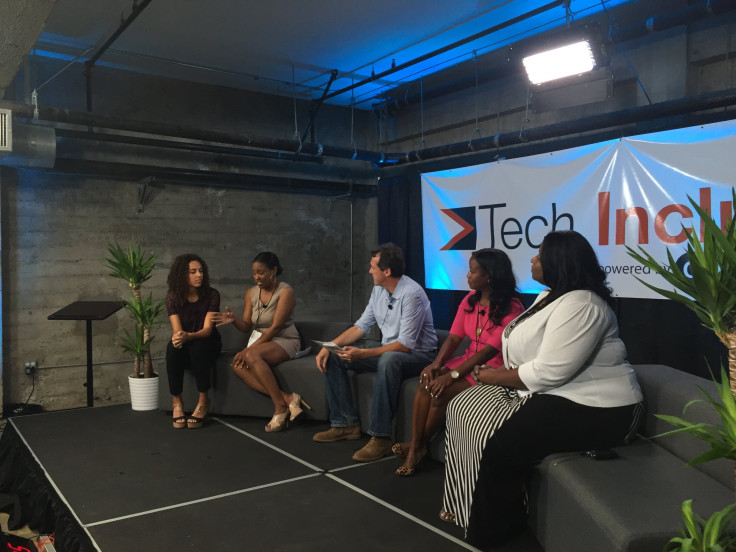Tech Diversity Gets Another Conference: Tech Inclusion 2015 Brings Google, Facebook, Twitter, Pinterest

SAN FRANCISCO -- A few weeks ago, Melinda Briana Epler and Wayne Sutton were unsure whether anyone would show up for Tech Inclusion, the technology industry diversity conference they’ve been planning for months. This week, they had to start turning people away after the event sold out, the latest sign that the tech industry’s diversity movement is quickly gaining momentum.
Although conferences focusing on women and specific ethnicities have been around a while, Tech Inclusion 2015 is the one of the first of its kind, focused on diversity and inclusion in Silicon Valley for people of all ages, ethnicities, genders, sexualities or other kinds of backgrounds. It is also the latest effort by techies to bring more diversity to their industry, whose inclusion figures for women, Hispanics and African-Americans are embarrassingly low. Kicking off Friday morning, the conference has drawn more than 350 attendees and 120-plus speakers, including people from major tech companies such as Facebook Inc., Google Inc., Pinterest, Twitter Inc. and Yelp Inc.
“We put a lot of thought into every single aspect of diversity that we included, so not just color, not just gender, but we look at veterans, mental disability, we look at age, we look at LGBT and, of course, African-Americans and Latinos,” said Sutton, general partner at Buildup.vc, a preaccelerator for startups based in San Francisco. Sutton also pointed out that the conference will feature a career fair with more than 600 attendees Saturday: It will include many diverse designers, engineers and others, making it the perfect spot for “all the companies that say they’re looking for diverse talent.”
For Epler and Sutton, who are two of the most active and outspoken leaders of tech’s diversity movement, selling out of tickets for the conference is a positive sign that the industry is taking diversity seriously. The tech industry began to address this matter in 2014 with many major companies releasing diversity reports for the first time, but as second-year diversity reports rolled out in 2015, many tech firms underwhelmed with their lack of progress. Epler said she believes 2015’s disappointing figures have actually motivated more people to get involved in tech’s diversity movement.
“The numbers are still pretty grim, and people are realizing that it’s going to take hard work and take time to really shift those numbers,” said Epler, who is CEO and founder of Change Catalyst, which is an accelerator and investment platform for women. “We have a lot of people coming to the conference to learn how to do that.”
Michael Reta is one of those attendees. Reta, a recruiter for Simple Finance, a banking tech company, flew in from Portland to attend the conference. His company is hoping Reta can expand his network and learn new strategies that will help Simple as the firm kicks off its diversity push.
“I’ve been taking a lot of notes. I’m hoping once I sit down and read them I’ll have a better idea of what to present on what I gained from this conference,” Reta said. “But I’m coming into it as an open book hoping to fill the pages.”
The conference features panel discussions and workshops that focus on a variety of topics of importance for women and minorities in tech. The event kicked off with a panel featuring the heads of diversity at major tech firms, along with a session focused on what entrepreneurs can do to access venture capital. It’ll also include sessions on how one can become a diversity ally, how businesses can establish best practices for inclusion and much more.
“This is a person-who’s-working-in-diversity’s dream come true,” said Abby Maldonado, Pinterest’s diversity-programs specialist and one of the conference’s speakers. “If you’re really committed to making changes, being here, being present, learning and interacting with other individuals in this space is really critical.”
But for all the success Tech Inclusion is having in its first year, Epler and Sutton know there is more work to be done. The pair are hoping to turn the event into an annual occurrence, expand it to New York and hold smaller events throughout the year so they can reach more people. Epler said she is also hopeful that some companies who chose not to participate this year will do so next year.
“We reached out to a lot of companies who we were surprised were not interested in partnering and weren’t interested in speaking,” Epler said. “There’s still a long way to go in the industry as a whole, and this is the beginning.”
Correction, Saturday, 4:30 p.m. EDT: This article has been changed to reflect the fact that Tech Inclusion is not the first conference focused on tech diversity across-the-board. Others such as AlterConf and Push Tech 2020 have also been held in the past year.
© Copyright IBTimes 2024. All rights reserved.





















